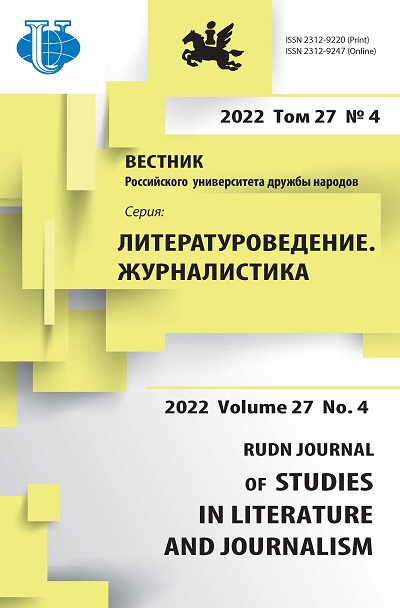A man as a Buddhist imaginary in L. Yuzefovich's novel “Cranes and Dwarfs”
- Authors: Dubakov L.V.1
-
Affiliations:
- Shenzhen MSU-BIT University
- Issue: Vol 27, No 4 (2022)
- Pages: 669-676
- Section: LITERARY CRITICISM
- URL: https://journals.rudn.ru/literary-criticism/article/view/33278
- DOI: https://doi.org/10.22363/2312-9220-2022-27-4-669-676
- ID: 33278
Cite item
Full Text
Abstract
Buddhism finds a diverse reflection in the work of L. Yuzefovich for many decades. Buddhist ideas and motifs are present in his early book “The Autocrat of the desert. Baron R. Ungern von Sternberg and the world in which he lived,” in some of his other prose texts, in poetry. In the proposed work, within the framework of a large study devoted to the Buddhist text of modern Russian literature, the influence of Buddhism on Leonid Yuzefovich's novel “Cranes and Dwarfs” is analyzed. The Buddhist idea of the illusory nature of reality and man is reflected in the plot of the work and in the organization of the system of characters. The novel intrigue is based on the principle of repetition, realized in space, time and in human destinies. The heroes of “Cranes and Dwarfs,” according to one of the possible interpretations offered by the novel, represent one consciousness that changes its forms in Russian history. At the same time, the illusory nature of a separate human existence is perceived by the author not in a pessimistic way, but as evidence of the spiritual kinship of all living things. The author also draws parallels to a similar perception of reality and people in the novel “Prince of the Wind” and the story “Sand Riders” by Yuzefovich and the book by E. Limonov “The Old Man Travels.”
Keywords
About the authors
Leonid V. Dubakov
Shenzhen MSU-BIT University
Author for correspondence.
Email: dubakov_leonid@mail.ru
ORCID iD: 0000-0003-1172-7435
Candidate of Philological Sciences, Associate Professor of the Faculty of Philology
1 International University Park Road, Longgang District, Shenzhen, 518172, People's Republic of ChinaReferences
- Abasheva, M.P. (2010). The Elephant's Move, or Why Leonid Yuzefovich's novel “Cranes and Dwarfs” received the “Big Book” award. Filolog, (10). (In Russ.) Retrieved July 31, 2022, from http://philolog.pspu.ru/module/magazine/do/mpub_10_19
- Androsov, V.P. (2001). Shakyamuni Buddha and Indian Buddhism. Modern interpretation of ancient texts. Moscow: Vostochnaya Literatura Publ. (In Russ.)
- Limonov, E.V. (2020). The old man travels. Moscow: Individuum Publ. (In Russ.)
- Maroshi, V.V. (2010). Semiotics of Karakorum in modern Russian literature. Kritika i Semiotika, (14), 228–240. (In Russ.)
Supplementary files















